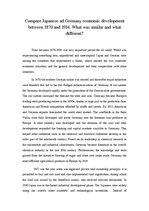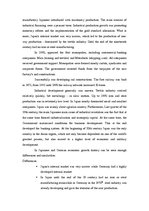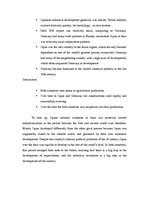-
Compare Japanese ad Germany Economic Development Between 1870 and 1914
• Japan was the only country in the Asian region, which not only become dependent on one of the world's greatest powers, meanwhile Germany had many of the neighboring country with a high level of development, which often surpassed Germany in development.
• Germany became dominant in the world's chemical industry in the late 19th century.
Similarities:
• Both countries were prone to agricultural production.
• Over time in Japan and Germany rail constructions were rapidly and successfully evolving.
• Over the time for both countries very important was steal production.
To sum up, Japans national weakness in basic raw materials slowed industrialization in the period between the first and second world wars therefore. Mainly Japan developed differently from the other great powers because Japan was supposedly closed to the outside world, and governed by their own economic development. Despite the country's internal political problems of the 19 century Japan over the time was capable to develop in the rest of the world’s level. In both countries, this period changed their look to the future, realizing that there is a big leap in the development of expectations, and the industrial revolution is a big step in the development of the country.
…
Compare Japanese ad Germany economic development between 1870 and 1914. What was similar and what different?Time between 1870-1914 was very important period for all world. World was experiencing something new, unpredicted and unexampled. Japan and German were among the countries that experienced a boom, which resized the two countries' economic situation, and the general development and their cooperation with other countries. In 1870 the modern German nation was created and thereafter major industries were founded that led to the full fledged industrialization of Germany. A rail system for Germany developed rapidly under the promotion of the German state governments. The rail system increased the demand for steel and coal. Germany became Europe's leading steel-producing nation in the 1890s, thanks in large part to the protection from American and British competition afforded by tariffs and cartels.



